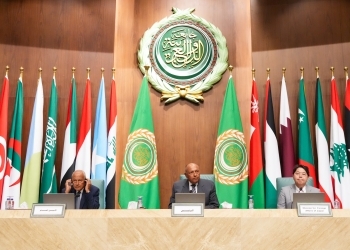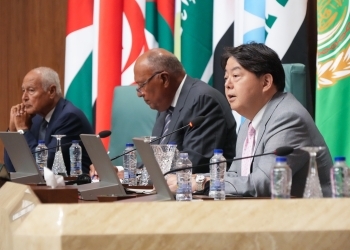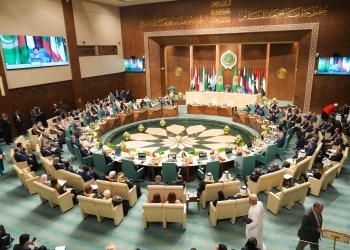Countries & Regions
The Third Japan-Arab Political Dialogue



On September 5, starting at 6:00 p.m. local time (0:00 a.m. on September 6 JST) for approximately 2 hour and 10 minutes, the third Japan-Arab Political Dialogue was held in Cairo, the capital of the Arab Republic of Egypt. The overview is as follows.
This political dialogue was hosted by H.E. Mr. Ahmed Aboul Gheit, Secretary General of the League of Arab States. Mr. HAYASHI Yoshimasa, Minister for Foreign Affairs of Japan, represented the Government of Japan, co-chairing with H.E. Mr. Sameh Shoukry, Minister of Foreign Affairs of the Arab Republic of Egypt. The joint statement (English (PDF) / Japanese (PDF)
/ Japanese (PDF) ) was adopted at the end of the meeting. The meeting was attended by the Secretary-General of the League of Arab States, as well as 12 foreign ministers and other 5 ministerial level representatives from 21 member states and one organization of the League of Arab States.
) was adopted at the end of the meeting. The meeting was attended by the Secretary-General of the League of Arab States, as well as 12 foreign ministers and other 5 ministerial level representatives from 21 member states and one organization of the League of Arab States.
1. Opening Session
Foreign Minister Hayashi delivered a speech focused on the future Japan-Arab cooperation (English (PDF) / Japanese (PDF)
/ Japanese (PDF) ). Minister Hayashi called for unity to uphold the free and open international order based on the rule of law as the international community is at a historic turning point, caused by Russia’s aggression against Ukraine among others. Minister Hayashi further expressed that as the situation in the Middle East is evolving dynamically, Japan wishes to build a relationship between Japan and the Arab countries as “partners” to tackle together challenges faced by the region and the international community.
). Minister Hayashi called for unity to uphold the free and open international order based on the rule of law as the international community is at a historic turning point, caused by Russia’s aggression against Ukraine among others. Minister Hayashi further expressed that as the situation in the Middle East is evolving dynamically, Japan wishes to build a relationship between Japan and the Arab countries as “partners” to tackle together challenges faced by the region and the international community.
Minister Hayashi then called for future cooperation across a range of fields under the following three pillars: (a) "Collaboration toward prosperity" (strengthening economic relationship from a long-term perspective in a wide range of areas with Middle Eastern countries); (b) "Initiative toward consolidation of peace" (continued assistance to Palestine and unstable countries, continued cooperation through regional cooperative frameworks, and cooperation in the area of security and defense that contributes to regional stability); and (c) "Efforts through dialogue and practice toward maintaining and strengthening the free and open international order based on the rule of law" (promoting understanding of the Free and Open Indo-Pacific (FOIP) and promoting cooperative maritime security projects).
2. Working Session
Minister Hayashi referred to the situation in Ukraine, the Middle East peace, and the situation in East Asia, including North Korea.
Regarding Russia’s aggression against Ukraine, Minister Hayashi stated that Russia must withdraw from Ukraine, and that just and lasting peace must be restored in Ukraine as soon as possible. He stressed that Russia’s nuclear threat is absolutely unacceptable, and Russia should never use nuclear weapons under any circumstances. Minister Hayashi expressed Japan’s intention to continue close communication with the Arab countries on this matter.
On the Middle East peace, Minister Hayashi stated that the situation on the ground remains unpredictable, and called for restraint on unilateral actions and measures. He explained that Japan is contributing to the Palestinian economy and confidence-building through its own initiatives, such as the “Corridor for Peace and Prosperity.”
Minister Hayashi also shared Japan's views on the situation in East Asia. He stated that Japan would continue to cooperate with Arab countries in dealing with North Korea, including on nuclear and missile issues and the abductions issue.
In addition, Minister Hayashi explained that the release of ALPS-treated water from the Fukushima Daiichi Nuclear Power Plant into the ocean was conducted in accordance with international standards and practices and with all possible safety precautions in place.
Many participants from the Arab countries appreciated Japan's past contributions to peace and stability in the region, and expressed high expectations for strengthening cooperation with Japan, and continuing to hold this Political Dialogue.
3. Closing Session
The joint statement was adopted, and Minister Hayashi stated his determination to deepen relations with the Arab countries in a more comprehensive and multi-layered manner, building upon the success of today's meeting.

